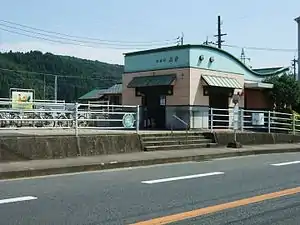Iwaya Station (Saga)
Iwaya Station (岩屋駅, Iwaya-eki) is a railway station on the Karatsu Line operated by JR Kyushu located in Karatsu, Saga Prefecture, Japan.[1][2]
Iwaya Station 岩屋駅 | |
|---|---|
 Iwaya Station in 2008 | |
| General information | |
| Location | Japan |
| Coordinates | 33°19′51″N 130°02′18″E |
| Operated by | |
| Line(s) | ■ Karatsu Line |
| Distance | 23.3 km from Kubota |
| Platforms | 1 side platform |
| Tracks | 1 |
| Construction | |
| Structure type | At grade |
| Bicycle facilities | Designated parking area for bicycles |
| Other information | |
| Status | Unstaffed |
| Website | Official website |
| History | |
| Opened | 13 June 1899 |
| Previous names | Motoyama (until 1 November 1903) |
| Location | |
 Iwaya Station Location within Japan | |
Lines
The station is served by the Karatsu Line and is located 23.3 km from the starting point of the line at Kubota.[3]
Station layout
The station consists of a side platform serving a single track. A small concrete waiting room/shelter has been set up behind the platform and there is a designated parking area for bicycles nearby. The station is unstaffed and there is no ticket window but kan'i itaku agents sell some types of tickets from nearby shops.[3][2][4]
History
On 1 December 1898, the Karatsu Kogyo Railway had opened a track from Miyoken (now Nishi-Karatsu) to Yamamoto. On 13 June 1899, the track was extended to Kyūragi with this station, at that time named Motoyama, opening on the same day as an intermediate station on the track. On 23 February 1902, the company, now renamed the Karatsu Railway, merged with the Kyushu Railway. On 1 November 1903, the station was renamed Iwaya. When the Kyushu Railway was nationalized on 1 July 1907, Japanese Government Railways (JGR) took over control of the station. On 12 October 1909, the line which served the station was designated the Karatsu Line. With the privatization of Japanese National Railways (JNR), the successor of JGR, on 1 April 1987, control of the station passed to JR Kyushu.[5][6]
Passenger statistics
In fiscal 2016, the daily average number of passengers using the station (boarding passengers only) was above 100 and below 323. The station did not rank among the top 300 busiest stations of JR Kyushu.[7]
Environs
- National Route 203
- Karatsu City Motoyama Elementary School
References
- "JR Kyushu Route Map" (PDF). JR Kyushu. Retrieved 3 March 2018.
- "岩屋駅" [Iwaya]. hacchi-no-he.net. Retrieved 10 March 2018.
- Kawashima, Ryōzō (2013). 図説: 日本の鉄道 四国・九州ライン 全線・全駅・全配線・第5巻 長崎 佐賀 エリア [Japan Railways Illustrated. Shikoku and Kyushu. All lines, all stations, all track layouts. Volume 5 Nagasaki Saga area] (in Japanese). Kodansha. p. 15, 81. ISBN 9784062951647.
- "岩屋駅" [Iwaya Station]. jr-mars.dyndns.org. Retrieved 10 March 2018. See images of tickets sold.
- Ishino, Tetsu; et al., eds. (1998). 停車場変遷大事典 国鉄・JR編 [Station Transition Directory – JNR/JR] (in Japanese). Vol. I. Tokyo: JTB Corporation. pp. 223–4. ISBN 4-533-02980-9.
- Ishino, Tetsu; et al., eds. (1998). 停車場変遷大事典 国鉄・JR編 [Station Transition Directory – JNR/JR] (in Japanese). Vol. II. Tokyo: JTB Corporation. p. 720. ISBN 4-533-02980-9.
- "駅別乗車人員上位300駅(平成28年度)" [Passengers embarking by station - Top 300 stations (Fiscal 2016)] (PDF). JR Kyushu. 31 July 2017. Archived from the original (PDF) on 1 August 2017. Retrieved 3 March 2018.
External links
- Iwaya Station (JR Kyushu)(in Japanese)